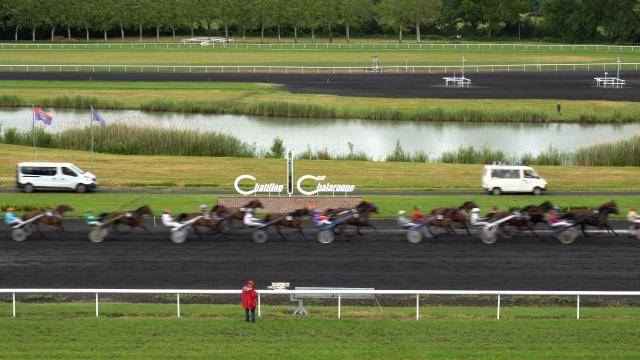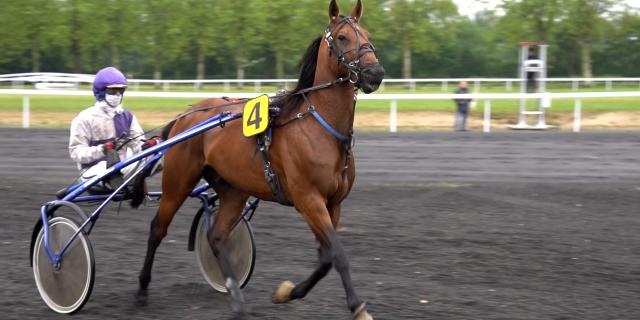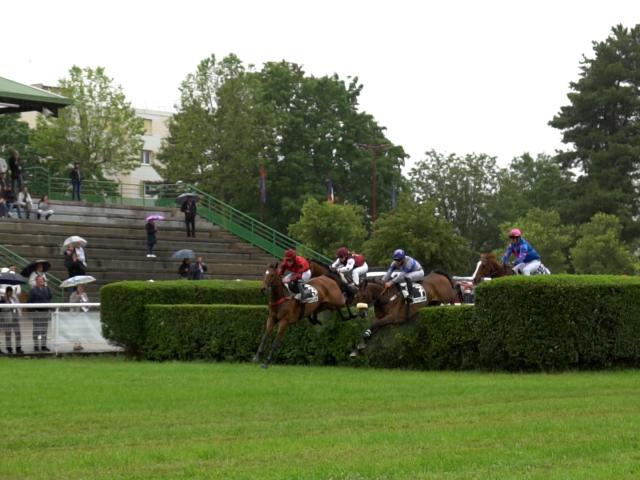Every year, the Bel-Air racecourse at Châtillon-sur-Chalaronne attracts up to 5,000 spectators who come to watch the traditional horse races.
On-site entertainment includes horse betting and fast-food outlets.
 Course à l'hippodrome de Châtillon sur Chalaronne
Course à l'hippodrome de Châtillon sur ChalaronneEvery year, the Bel-Air racecourse at Châtillon-sur-Chalaronne attracts up to 5,000 spectators who come to watch the traditional horse races.
On-site entertainment includes horse betting and fast-food outlets.

March 10, 2024 from 12:00 to 18:00* Free children’s entertainment
Every Monday from March 18, 2024 to March 25, 2024 from 12:00 to 18:00
April 22, 2024 from 12:00 to 18:00* Paquôdrome – Free children’s entertainment
May 1, 2024 from 12:00 to 18:00* Hippodrome en Fête – Free children’s entertainment
May 20, 2024 from 12:00 to 18:00* Pentecost – Elegance Day – Free children’s entertainment
June 10, 2024 from 12:00 to 18:00* Trotting & Flat races
Admission €5 – Free for children under 16
One of the horse racing events not to be missed at the Châtillon racetrack is harnessed trotting.
Harnessed trotting is a race in which trotting horses pull a small two-wheeled vehicle which is called a “sulky” and driven by a “driver”. Horses must trot as fast as possible to reach the finish line first, but can be disqualified if they break into a gallop!
If you prefer to see horses at full gallop, we recommend you attend a flat race or, even more impressive, a hurdle race!


Flat races are races where the horses are at full gallop and aim to be first to cross the finish line. The horses are ridden by riders known as jockeys. They begin in stalls, where they must wait for the gates to open automatically at the start of the race. Before the race, a draw decides under which number each horse will run, which in turn determines its starting stall. No. 1 will be on the inside fence and No. 18 completely on the outside, where the horse will have to cover a greater distance on the bends.
Obstacle races follow the same principle as flat racing, except that an elastic tape is used at the start line instead of stalls, and the track features a succession of obstacles that the horses will have to clear.
There are three types of obstacle race: hurdles, steeplechase and cross-country.
In hurdle racing, the obstacles are relatively modest, about 1.10 metres in height. The race distance varies between 3,000 and 5,000 meters, but the majority of races are run over 3,500 to 3,900 meters.
The most frequent obstacle race at the Châtillon-sur-Chalaronne racecourse is the steeplechase. This is considered the most prestigious jumping discipline because the distance covered by the horses is greater and the fences are higher and more complex than a hurdle race.

Did you know?
The Place du Champ de Foire in Châtillon-sur-Chalaronne was once the site of the livestock fair, where cows, horses, donkeys and other animals were sold. Its upper horseshoe-shaped area, now surrounded by plane trees, used to host horse races.
It was in July 1864 that the town council sealed a decision to finance the purchase of land for horse racing. The “Bel-Air” racecourse was inaugurated the following year.

Horses have historically played a very important role in the region. Indeed, the Dombes was a feudal region where several lords were in need of warhorses for their soldiers, as well as horses for transport purposes and to work in the fields.
There was a breed unique to Dombes, the Dombes “demi-sang”, or half-blood, a hardy, black or bay horse with a good reputation. The breed was very common until the 18th century. The “demi-sang de la Dombes” was integrated into the Selle Français breed in the 1970s. Despite the decline in equine activity due to the arrival of engines, the Dombes remains one of France’s leading regions in this field, with its many stud farms, stables, riding schools and horse races…
Avenue Charles de Gaulle
01400 Châtillon-sur-Chalaronne
Contact the racecourse : 04 74 55 28 14
http://www.hippodromebelair.fr/